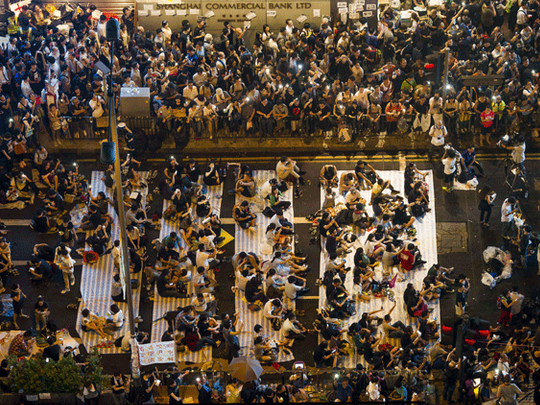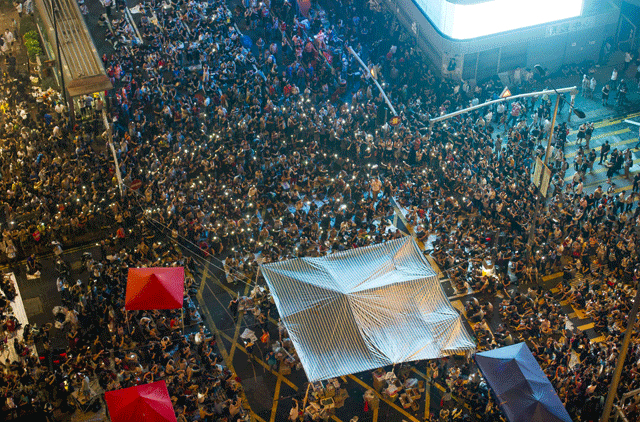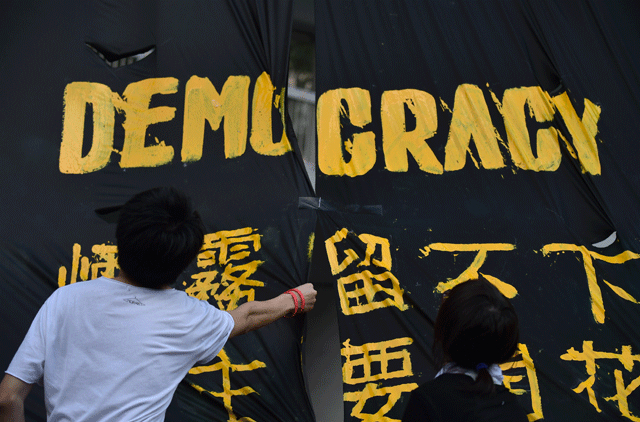
HONG KONG: Some academics at the forefront of Hong Kong’s fight for more democracy say they have become targets of death threats or other intimidation as the former British colony remains near-paralysed by the biggest protests since it returned to Chinese rule in 1997.
Hong Kong has freedoms not enjoyed on the mainland, but Beijing last month rejected demands for free elections to choose the city’s next leader, prompting outrage and protests by tens of thousands of people, mostly students, who have blockaded roads in the global financial hub.
Riot police fire tear gas and pepper spray at large-scale rallies over the weekend. Although Monday was relatively peaceful, protesters were on edge on Tuesday, fearing a new round of police action.
Chan Kin-man, a professor of sociology at the Chinese University who has been on the front lines of the protests, said he has a stack of envelopes containing death threats scrawled in Chinese characters.
“I understood that once I joined this movement, they would attack me and treat me as an enemy,” Chan told Reuters, his head shaved in protest against Beijing’s decision to rule out free elections for the city’s next leader in 2017.
Chan is a co-founder of the “Occupy Central” group that wants to lock down the business district.
Another co-founder, Benny Tai, a law professor at the University of Hong Kong, said he had also received death threats, some addressed to “The Devil”, with one envelope containing a razor blade.
Five other academics told Reuters they had suffered intimidation because of their activism.
It was not immediately clear who was behind the intimidation or threats. Chinese officials, worried that calls for democracy will spread to cities on the mainland, threatening the Communist Party’s grip on power, have said the Occupy movement is illegal.
But Tai doesn’t believe Beijing sanctioned the letters.
“For Beijing, I think it’s important to protect me,” Tai told Reuters. “If I am in trouble, the blame will be on Beijing.” Neither Chan nor Tai reported the death threats to police.
Tai told Reuters he did not believe it would be possible to trace them while Chan said he was advised by Tai not to make it a police case.
Tai said a handful of core Occupy organisers abruptly left the movement and he attributes their departure to intimidation, possibly through their business ties with mainland China.
“We know that kind of thing is happening,” he said, declining to give details or say how many people had left.
Another academic and Occupy supporter, Joseph Cheng, a political-science professor at City of Hong Kong University, said he has also been targeted.
Pro-Beijing newspaper Wen Wei Po has accused him of plagiarism and not reporting extra income, charges he has denied, though complaints were also lodged with his university, which said in an emailed statement that it was investigating in accordance with established rules and procedures.
Wen Wei Po declined to comment and Hong Kong’s office of mainland affairs and its liaison office did not respond to phone calls or faxes requesting comment.
Cheng told Reuters his computer has been hacked, his access to databases and relationships with mainland academics has deteriorated and he has struggled to obtain research funding.
Pro-Beijing groups had stormed his lectures, urged the city’s anti-graft agency to investigate him and harassed him outside his home, he said, adding that his wife had also been followed.
Meanwhile, throughout Tuesday morning protester numbers dwindled from their overnight highs, when tens of thousands turned the city’s downtown into a carnival after riot police withdrew.
But they began to pick up again by the afternoon and people manning makeshift barricades showed no signs of backing down.
“We are all afraid, but we think we should keep on resisting for full democracy,” Jacky Yip, a 22-year-old university student told AFP as thunder rumbled in the evening.
“Never lose hope,” was one of the signs offering words of encouragement at one site.
Protesters have two demands — that Leung step down and Beijing rescind its insistence that his successor be vetted before standing for election.
Alex Chow, chairman of the Hong Kong Federation of Students, called on the government to respond to those demands by Thursday.
“If the government does not respond after October 2, the action will inevitably be stepped up,” he told reporters.
But analysts say the chances of Beijing backing down are virtually non-existent, leaving a city once renowned for its stability plunged into an unknown future — with democracy activists concerned the police could return in force at any moment.
Beijing stayed defiant Tuesday, saying it supported Hong Kong’s handling of the protests, which it described as “illegal activity”.
“We fully believe in and support the Hong Kong SAR government to deal with this issue,” foreign ministry spokeswoman Hua Chunying said at a regular briefing.
Communist authorities are worried that dealing with the protests too softly could encourage wider demands for greater freedoms on the mainland, observers say.
Hong Kong authorities meanwhile are caught between protester demands, Beijing’s uncompromising stance and efforts to keep the city running.
Business leaders complain that the protests are hitting the economy. The world’s top cosmetics group L’Oreal said on Tuesday it was suspending all business travel to Hong Kong due to the street demonstrations.
Many locals have expressed frustration at the huge disruption, with the crowds blocking key junctions in the busy Causeway Bay and Mongkok shopping districts as well as the biggest protest site in Admiralty near the government headquarters.
Police Tuesday again called for the protesters to disperse, saying emergency services were being disrupted by the ongoing blockade of major carriageways.
But the demonstrations have also prompted displays of solidarity. Some social workers and teachers went on strike after unions called for members to take action.














